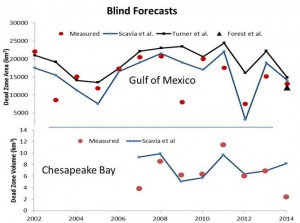For over ten years NCCOS has developed and improved hypoxia (dead zone) forecasts similar to seasonal weather forecasts. The accuracy of these forecasts is proving to be quite good. Professor Don Scavia of the University of Michigan tracks the accuracy of the NCCOS-funded annual forecasts and finds the models work well in years without hurricanes or tropical storms, which disrupt dead zones prior to taking measurements. This model accuracy increases confidence when researchers use them for providing advice on nutrient load reductions, a major factor driving these model predictions.

NCCOS sponsored dead zone ensemble model forecasts versus actual measurements from 2002 to 2014 for the Gulf of Mexico (top) and Chesapeake Bay (bottom). The models are particularly accuaratein years without hurricanes or tropical storms (e.g., 2009 and 2014). Credit: Don Scavia, University of Michigan.
Using a technique commonly employed in hurricane forecasting, called 'ensemble' modeling, researchers utilize multiple model formulations that independently forecast the same hypoxia event. Since no one model is perfect, multiple models and their resultant forecasts provide a better understanding of the accuracy and precision of the forecasts. Developing the cache of models was a collaborative effort between NCCOS, University of Michigan, Louisiana State University, Louisiana Universities Marine Consortium, Virginia Institute of Marine Sciences/College of William and Mary, Texas A&M University, North Carolina State University, and the United States Geological Survey.
Hypoxia forecasts are part of a larger NOAA effort to deliver ecological forecasts that support human health and well-being, coastal economies, and coastal and marine stewardship.
For more information, contact Alan Lewitus.
 Official websites use .gov
A .gov website belongs to an official government organization in the United States.
Official websites use .gov
A .gov website belongs to an official government organization in the United States. Secure .gov websites use HTTPS
A lock or https:// means you’ve safely connected to the .gov website. Share sensitive information only on official, secure websites.
Secure .gov websites use HTTPS
A lock or https:// means you’ve safely connected to the .gov website. Share sensitive information only on official, secure websites.